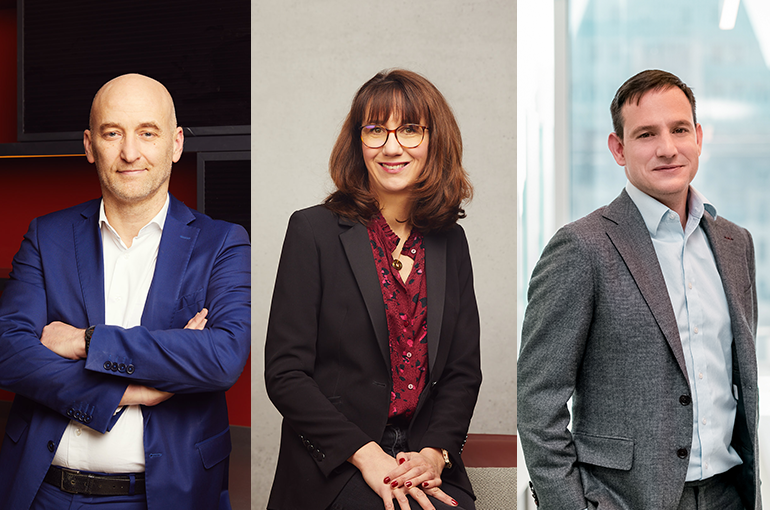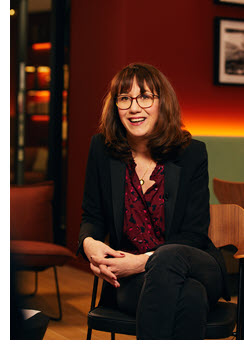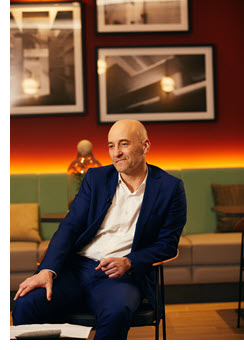Technology and the future of reinsurance
SCOR’s business teams have a strong appetite for innovation and are increasingly integrating new technologies into their work thanks to the IT teams.
23 juin 2021

What role do data and technology play in terms of ensuring SCOR’s success?
Marc Philippe, Chief Information Officer — In our industry, anything that provides additional capacity to collect and analyze data and statistics – be it about weather, health or cyber attacks – provides a competitive advantage in terms of assessing and modeling risks. With new technologies, we can dramatically increase our capacity to store and analyze data.
Corinne Trocellier, Chief Operating Officer of SCOR Global Life — At SCOR Global Life, data is our most valuable asset. We have created a Data Analytics Solution (DAS) team, comprising over 40 data scientists with multi-sector skills. They use state-of-the-art technologies to deliver ready-to-use artificial intelligence applications adapted to client needs. We have also launched the DAS platform, a unique collaborative system that allows actuaries, data scientists and data engineers to share knowledge across our organization, building innovative solutions for our clients. Last year, as the Covid-19 crisis raged across the world, the DAS team developed a SEIR model to forecast the evolution of the pandemic. The model was integrated into an app showcasing key figures and trends.
Rodolphe Herve, CEO North America & Global Head of Operations, Specialty Insurance — To keep providing our customers with the excellent service they’ve come to expect from SCOR, we need to pursue several objectives with data and technology.
Number one is reducing risk. The risk universe is expanding and becoming more and more complex and interlinked. We need to master a future of increasing data richness while fully connecting all of our systems, both internally and with the outside world.
Number two is efficiency. With toughening market conditions, cost leadership will be crucial. We are already very competitive at SCOR, so our goal is not to cut costs for the sake of it, but to fuel our ambitious growth plans efficiently.
Number three is compliance. In all the countries where we operate, oversight of regulatory legal compliance is increasing. Crises like the current pandemic have accelerated this trend. We need to ensure that our operating platforms maintain the highest degree possible of external and internal controls, and that they guarantee safe access to business. But everything we do comes back to providing value to our customers; technology is a strong enabler for that.

“ONLY BY ADOPTING AN AGILE MINDSET
AND EMBRACING NEW TECHNOLOGIES
CAN WE TAKE ADVANTAGE OF INNOVATION
AND HAVE A POSITIVE IMPACT
ON PEOPLE’S LIVES.”
Corinne Trocellier,
Chief Operating Officer of SCOR Global Life
Where is SCOR in its digital transformation process?
M.P. — As part of the “Quantum Leap” strategic plan, we identified five technologies that we felt would bring the greatest added value: artificial intelligence, big data, cloud computing, e-business and robotics. Despite the Covid-19 crisis, we have progressed according to plan, and in some areas we have even gone much further than expected.
C.T. — In our increasingly complex environment, we know that we cannot simply keep pace with change – we must anticipate it. Already in 2017, our IT Roadmap put data at the core of all SCOR’s systems and processes. It provided us with a framework that helped to anticipate the significant transformation we are going through today. Using Agile methodology we delivered SCOR hELIOS, a cloud-based platform that collects, transforms and manages data from our clients in a secure and compliant environment. hELIOS provides us with accurate information on the risks stemming from our portfolio. Combined with our data analytics and data science capabilities, it supports business development and innovative solutions.
Where can we see the transformation taking place today?
M.P. — One example is the automation of information capture. Our clients and partners provide a large amount of data in the form of Excel files, which are always complicated to transform, validate and import into our systems. Using robotics, we can do this more fluidly and efficiently. And by automating low value-added tasks, we free up our people’s time for more high value-added ones. We work with partners of many kinds to develop our capabilities, including big technology providers, but we also work with smaller partners such as startups in the Insurtech area, who are sometimes more agile.
R.H. — A few examples for SCOR Global P&C include our new MGA Bordereaux technology (Alpha), with which we have cut the onboarding process of our MGA partners to hours/days – it used to take months – partnering with Amazon Web Services to process historical data.
I would also point to the work of our SCOR Ventures team, which is investing in and bringing Insurtech innovations to the organization: for instance, our investment in Branch, a U.S. home and auto personal insurance company, which we see as the future of personal lines. From a prospect’s name and address, Branch can pull available information on an individual and determine risk profile and claims history, providing that customer with an attractive quote for a unique, bundled policy in a matter of seconds.
C.T. — SCOR Global Life is also partnering with startups and Insurtech to offer innovative health solutions. Our subsidiary ReMark is a great example of transformation from a direct marketing company to a true Insurtech. ReMark helps our clients gain, retain and engage policyholders by delivering the best consumer experience possible – from quote to claim.

“DATA AND TECHNOLOGY
ARE AT THE FOREFRONT OF WHAT WE DO.
AT SCOR,
WE AIM TO LIFT THE INDUSTRY STANDARD.”
Rodolphe Herve,
CEO North America & Global Head of Operations, Specialty Insurance
What are the main challenges now?
C.T. — Our industry is undergoing a full transformation, accelerated by the Covid-19 pandemic. SCOR will need to continue to invest in digital skills – from product development to cloud computing – and in new profiles to complement our current talent pool. The main challenge, however, is to move from the innovation mindset to implementation and deployment, fully introducing all the technologies we are now mastering into our systems, our processes and the services we provide to our clients.
M.P. — We need to be close to our clients for this to happen. Anything we provide can only be efficient if it is deployed all along the value chain – insurers, brokers, other partners, reinsurers – we all need to be able to work together in the digital experience. This means continuing to introduce standards for exchanging data, such as Rushlikon, and to participate in initiatives like B3i, which is aimed at introducing blockchain into our processes.
How is the digital transformation affecting your teams?
M.P. — To some extent, in terms of intention, SCOR has not changed. We are still trying to get more and more information, and to develop our expertise, methodologies and models to assess risk. But the technology is changing, and because of this we have changed the way we collaborate.
C.T. — Our Knowledge community and IT teams recently co-developed Vitae, a new biometric risk calculator that uses machine learning to offer improved assessments of biometric risk, a better experience for the end user and fairer pricing. This would not have been possible without the close collaboration of our actuaries, who account for 27% of our workforce at SCOR Global Life, and our underwriters, our Knowledge teams and the SCOR IT team.
M.P. — Capturing more data also creates risks in terms of security. To maintain the level of security required in our industry, we believe that key people on our teams – who have an overview of the end-to-end information system – are the ones who can allow us to provide security exactly where it’s required.
R.H. — The digital transformation enables processing simplification and efficiency. We continue to modernize our back office and claims functions with eProcessing, robotics and artificial intelligence technologies to bring automation and agility to our workforce.

“DESPITE THE COVID-19 CRISIS,
WE PROGRESSED ON OUR TRANSFORMATION AGENDA,
AND IN SOME AREAS EVEN MORE THAN EXPECTED.”
Marc Philippe,
Chief Information Officer
Which technology has the most potential for impact?
M.P. — One of the key game-changing technologies is certainly the cloud. It provides flexibility to our operations, as well as much greater capacity in terms of processing and managing data. That’s why we have put this technology at the heart of our “Quantum Leap” ambitions. We are progressively moving all our systems into the public cloud. Of course, there are risks in terms of cyber-attacks. But it’s certainly much riskier not to update our technology, to stick with technologies that are aging. Moving to the cloud enables us to operate our processes efficiently, and we believe that this is the best way to innovate for our clients.